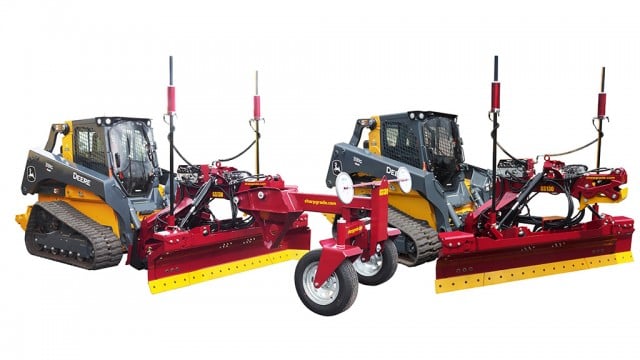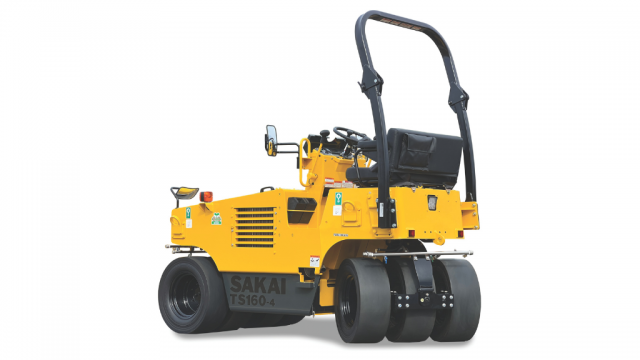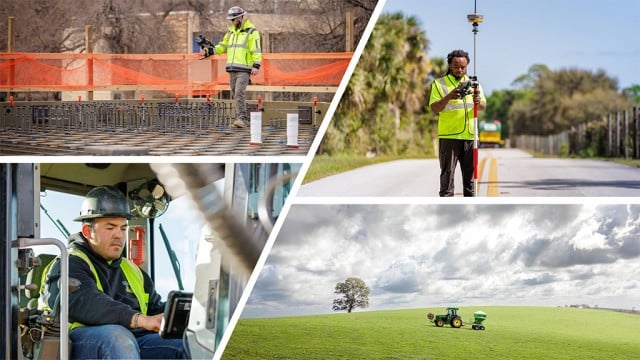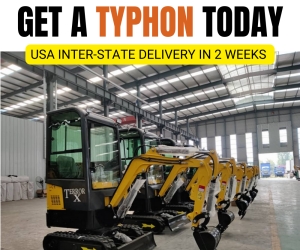Backhoe vs Excavator – Which One is Better for Construction?
Selecting a suitable machine brightens the chances of structural integrity and speedy project completion. The decision is a real game changer, especially when choosing between a backhoe and an excavator. Both have similar functions, but their size, strength, and capabilities vary greatly. Here, we suggest which is the best backhoe […] The post Backhoe vs Excavator – Which One is Better for Construction? appeared first on Used Equipment.

Selecting a suitable machine brightens the chances of structural integrity and speedy project completion. The decision is a real game changer, especially when choosing between a backhoe and an excavator. Both have similar functions, but their size, strength, and capabilities vary greatly. Here, we suggest which is the best backhoe vs. excavator to meet productivity for your project. Mico Crane and Equipment, Texas, is your go-to partner for selecting the right second-hand machine.
Backhoes are compact and perform small to medium-scale digging, loading, and lifting operations. On the other hand, excavators are mightier designed for large-scale extensive digging and heavy weight lifting over challenging terrains. Significantly, the selection depends on your needs to get the desired benefits. We offer technical insights into both machines and their uses to make an informed decision.
What are the Differences Between Backhoes and Excavators?
Obviously, a complete understanding of the backhoes and excavators technical features is essential to select the desired one. Mico Cranes and Equipment has an extensive range of backhoes and excavators for sale in the USA. Below is the in-depth comparison of the unique capabilities of both machines:
Design and Structure
Backhoe: this is a versatile piece of equipment with two-in-one design features. It has a combination of a loader and a digging arm. Moreover, the manufacturers integrate big rubber wheels for better mobility over paved surfaces. Likewise, its compact structure is ideal for work in confined spaces.
Excavator: This is specifically designed for digging and demolition activities and has a mighty boom, stick, and bucket. For smooth operator control, it has a 360-degree rotating cab. Also, it is available in tracked or wheeled undercarriage to navigate diverse terrains.
Size and Power
Backhoes: are developed for small-scale operations in urban settings, with 70 to 110 horsepower engines that can uphold operating weights of 13,000 to 25,000 lbs. You can deploy a backhoe for trenching, loading, and small-scale excavation.
Excavator: has more than 400 HP capacity. Thus, it is ideal for large-scale mining, heavy lifting, and extensive earthmoving. The user can handle 3,000 to over 200,000 lbs weight and extensive excavation. They are crafted to perform high-duty operations even in second-hand conditions.
Mobility and Versatility
Backhoe: can move at high speed over smooth surfaces. Therefore, it is commonly used for in-door material transportation or warehouse management.
Excavator: can navigate rough, muddy, or uneven surfaces. However, their traction speed is slow to keep the operator safe.
Attachments and Applications
Backhoe: have loader arm at front for loading and unloading materials. On the contrary, the back-mounted backhoe arm excels in small-scale trenching and digging. A used backhoe is for sale in Houston, Texas, and can be customized with buckets, augers, and breakers for your specific needs.
Excavator: Contractors can add grapples, shears, hammers, and rippers with an excavator to handle specialized tasks. This machine is the best support when managing large-scale excavation, dredging, or pipeline installation.
Cost Efficiency
Backhoe: is comparatively less expensive to purchase or rent. Therefore, it is ideal to manage small-scale operations with a smaller budget.
Excavator: has high upfront and maintenance costs. They are available in different sizes and specifications for medium to heavy-duty performance. Used excavators for sale in the USA are a cost-effective solution for the construction business.
A backhoe is your ideal partner if you need a versatile, smooth-mobility, and cost-efficient machine for lighter tasks. On the other hand, an excavator stands unmatched for large-scale operations. It is fortified with immense power, strength, and precision. Well, it is paramount to carefully assess your job site conditions and budget to make optimal purchases.
What are the Common Uses of Backhoes and Excavators?
Indeed, the primary functions of both backhoes and excavators are similar. However, the size and workload capabilities define their demand. You need a compatible machine with aligned technical features for precise, efficient, and safe operations. Here, the generalized applications of both are mentioned:
Uses of a Backhoe
The innovative design and compact structure with outstanding power make the backhoe a multipurpose machine. It can act as both a loader and a digging arm. Conveniently, their typical uses are listed below:
- Trenching and Digging: You can utilize it to trench holes for utility pipe installations. Likewise, the city management authorities used backhoes to install sewers and water lines in confined spaces.
- Material Handling and Loading: The front loader bucket is ideal for collecting, relocating, and lifting loose items like dirt, stone, or rubbish. Likewise, it is extensively utilized in small-scale residential development and landscaping projects.
- Snow Removal: Backhoes effectively remove snow from roadways and parking lots. You have to outfit it with specific buckets or blades.
- Road Maintenance: Importantly, backhoes are ideal for pothole restoration and road grading. It is available in small sizes and is portable to work in limited spaces
- Farming and Agricultural Work: Commonly used in rural regions for transporting feed and fertilizer for farming. Moreover, the landscaper is involved in planting trees and excavating irrigation canals.
- Demolition of Small Structures: Backhoes can manage the breakdown of walls, damaged pavements, or smaller obsolete buildings. The contractors can equip it with attachments like breakers.
- Landscaping: Ideal for landscaping work that involves clearing stumps, levelling the ground, or creating canals.
Uses of an Excavator
In fact, large-scale industrial and construction operations need durable structures to handle heavy-duty loading and unloading. Excavators are built to withstand extensive earthmoving for prolonged periods. Their main uses include:
- Deep Digging and Excavation: Excels at excavating massive underpinning, basement preparations, and deep tunnels. Developers frequently use it in multi-story buildings and bridge construction.
- Demolition: Excavators with hammer attachments are perfect for smashing rocks and demolishing significant buildings.
- Heavy Lifting: Excavators can lift and move massive rocks or structural steel. This feature is supported by its strong hydraulic systems.
- Earthmoving: Often utilized in large-scale digging projects, mining, and quarrying. It can alter the landscape by excavating reservoirs or constructing embankments.
- Dredging and Waterway Maintenance: In farming and agriculture, waterways, canals, and ditches are cleaned with large-size excavators. Excavators remove the deposited silt, debris, or vegetation.
- Pipeline Installation: Excavators can be deployed to dig ditches for utility supplies and fibre optic cable installation. You can integrate specialized buckets for precise results.
- Road Construction: It is essential for road construction projects involving grading and clearing substantial volumes of debris.
Steps to Determine Which One You Need a Backhoe or an Excavator
If you need a machine that can perform desired tasks without being overburdened. Likewise, using a large-scale machine to perform lighter operations unnecessarily increases fuel costs. Here, we suggest essential tips for selecting the correct machine for your project:
Analyze Your Project Scope
This quest starts with asking questions about the project’s nature, scale, and complexity. Moreover, you should have a complete understanding of which type of work you are going to do. Have you excavated for pipeline trenching or conducted extensive demolition? Used construction equipment for sale in Houston, Texas, is a cost-effective solution for all scales of activities.
Assess the Terrain Conditions
Obviously, the final selection of the backhoe or excavator is greatly influenced by the conditions of the proposed site. You should consider the available working area and the condition of the soil. A backhoe is optimal if you work in an urban setting with limited space. Likewise, tracked excavators are the best for navigating muddy or uneven ground.
Determine Mobility Concerns
When you have to move the machine frequently between different locations. The backhoe with massive and swift-moving rubber tiers is the compatible choice. On the other hand, excavators offer high maneuverability but slow speed. So, the contractors require tracked excavators to handle extensive operations over challenging sites.
Evaluate the Required Attachments
In construction activities, you have to perform specific jobs. So, select the machine compatible with innovative attachments to achieve the desired results without purchasing additional machines. Indeed, backhoes are versatile in their basic design and support loader and digger simultaneously.
Compare Power and Capacity Needs
Before deciding, ask simple questions like how much weight you must carry and for which distance. Similarly, you should know the depth and length of digging and excavations. Moreover, the operational timeframes are an essential factor. For light operations, you can opt for a moderate horsepower backhoe. An excavator is better for high-power and deep-digging activities.
Conclusion: Make the Right Choice for Your Project
In fact, the selection between a backhoe and an excavator ultimately depends on which type of work you require. Backhoes are multipurpose and support small-scale tasks, especially in confined spaces. However, the excavator is the only solution when you have to meet power and precision for heavy-duty operations. To make an optimal purchase, carefully analyze your project requirements. Contact Mico Cranes and Equipment, Texas, for the perfect machine to drive your project’s success!
The post Backhoe vs Excavator – Which One is Better for Construction? appeared first on Used Equipment.

 machineryasia
machineryasia 







